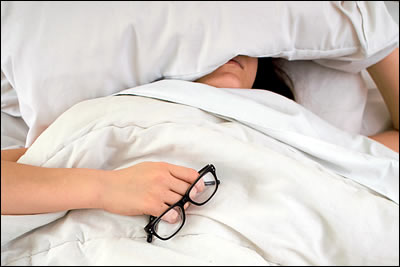6 Ways Sleep Can Help You Lose Weight

If you're trying to lose weight, the amount of sleep you get may be just as important as your diet and exercise.
Unfortunately, many people aren't getting enough sleep. In fact, about 30% of adults are sleeping fewer than six hours most nights, according to a recent study.
Interestingly, mounting evidence shows that sleep may be the missing factor for many people who are struggling to lose weight. Here are six reasons why getting enough sleep may help you lose weight.
Poor Sleep Is a Major Risk Factor for Weight Gain and Obesity
Poor sleep has repeatedly been linked to a higher body mass index (BMI) and weight gain. People's sleep requirements vary, but, generally speaking, research has observed changes in weight when people get fewer than seven hours of sleep a night.
A number off studies have found that poor sleep is associated with weight gain and a higher likelihood of obesity in both adults and children. It's a vicious cycle that can be hard to escape. Poor sleep can cause weight gain, which can cause sleep quality to decrease even further.
Poor Sleep Can Increase Your Appetite
Many studies have found that people who are sleep-deprived report having an increased appetite. This is likely caused by the impact of sleep on two important hunger hormones, ghrelin and leptin.
Ghrelin is a hormone released in the stomach that signals hunger in the brain. Levels are high before you eat, which is when the stomach is empty, and low after you eat. Leptin is a hormone released from fat cells. It suppresses hunger and signals fullness in the brain.
When you do not get adequate sleep, the body makes more ghrelin and less leptin, leaving you hungry and increasing your appetite. In addition, the hormone cortisol is higher when you do not get adequate sleep. Cortisol is a stress hormone that may also increase appetite.
Sleep Helps You Fight Cravings and Make Healthy Choices
Lack of sleep actually alters the way your brain works. This may make it harder to make healthy choices and resist tempting foods. Sleep deprivation will actually dull activity in the frontal lobe of the brain. The frontal lobe is in charge of decision-making and self-control.
In addition, it appears that the reward centers of the brain are more stimulated by food when you are sleep deprived. Therefore, after a night of poor sleep, not only is that bowl of ice cream more rewarding, but you'll likely have a harder time practicing self-control..
Poor Sleep May Decrease Your Resting Metabolism
Your resting metabolic rate (RMR) is the number of calories your body burns when you're completely at rest. It's affected by age, weight, height, sex and muscle mass. Research indicates that sleep deprivation may lower your RMR.
In one study, 15 men were kept awake for 24 hours. Afterward, their RMR was 5% lower than after a normal night's rest, and their metabolic rate after eating was 20% lower.
Sleep Can Enhance Physical Activity
A lack of sleep can cause daytime fatigue, making you less likely and less motivated to exercise. In addition, you're more likely to get tired earlier during physical activity. The good news is that getting more sleep may help improve your athletic performance.
Sleep Helps Prevent Insulin Resistance
Poor sleep can cause cells to become insulin resistant. Insulin is a hormone that moves sugar from the bloodstream into your body's cells to be used as energy. When cells become insulin resistant, more sugar remains in the bloodstream and the body produces more insulin to compensate.
The excess insulin makes you hungrier and tells the body to store more calories as fat. Insulin resistance is a precursor for both type 2 diabetes and weight gain. Studies suggest that only a few nights of poor sleep can cause cells to become insulin resistant.

